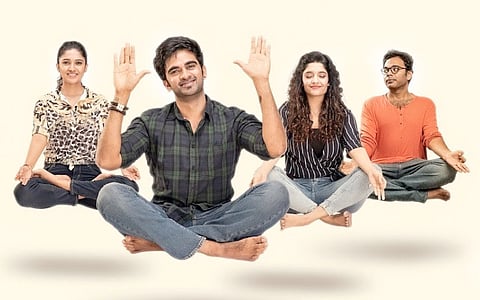
- Reviews
- Power List 2024
- Cannes 2024
- In-Depth Stories
- Web Stories
- News
- FC Lists
- Interviews
- Features
- FC SpecialsFC Specials

Director: Ashwath Marimuthu
Cast: Ashok Selvan, Ritika Singh, Anu Bhojan
If the 2000s belonged to a set of filmmakers inspired by the likes of Balu Mahendra, Mahendran and Mani Ratnam, it looks like the 2020s will go to a class that has passed out of the Vetri Maaran–Selvaraghavan–Gautham Vasudev Menon School of Cinematic Complexities. Oh My Kadavule (OMK) even begins with a dedication to GVM; but his influence over this year's Valentine's Day release extends mainly to the film's surface-level detailing.
For instance, one of the film's seminal scenes plays out over the theme of Minnale (which is playing on TV/radio). A character is defined by the most Menonesque of vocations…boxing, while another works as one of GVM's assistants (he even gets a cameo). And when the lead gets confused in love, he doesn't kickstart his bullet to ride all the way to Ladakh seeking romantic enlightenment. He chooses to just 'Aaromale' his way through Kerala. This confusion itself fits right in, because he's torn between his feelings for a) a Christian girl and b) a girl's that older than him. Also obviously, the protagonist (Arjun, played by Ashok Selvan) is an engineering graduate who nurses dreams of a career in cinema.
At least that's the first impression you get from OMK when it begins in a bar (not a coffee shop) with a proposal where Anu (Ritika Singh) asks Arjun if he will marry her. But this moment is not the culmination of a timeless love story nor is it a statement on female empowerment, with the woman doing the proposing. 'Why can't two best friends get married?' is the question that's driving this proposal. If 'why not?' is all you've got as the answer, that's what the first half of OMK looks like.
What director Ashwath Marimuthu does with OMK is define the gap that separates friendship from love. In other words, it's not about 'Who you can live with'. It's more about 'Who you can't live without' and he shows you the distinction between the two. For this, Ashwath replants the Hollywood classic It's A Wonderful Life within the mould of a Tamil romcom to show us two outcomes of the same scenario. And if Frank Capra's fantasy begins with a man on the verge of suicide, what we see here is a man on the verge of divorce, after having married the 'wrong' girl. But the question is, would he do it differently if he were given a second chance?
What this narrative structure allows for is a series of great echo scenes. But before that, we get a series of cliches on what comprises a bad marriage, which takes us most of the film's first half. This is where the writing remains the weakest, hardly displaying the level of perceptiveness and the maturity we see later. So we get scenes like the husband making fun of the wife's rock-hard dosa that ends with him telling her that it doesn't come close to his mother's. We then get the other cliche of the man's overall embarrassment at having to work for his wife and his father who runs a business Arjun has no respect for. Matters like the couple's sex life, or the lack of one, too are just tossed in without really meaning anything.
Even the tone here is just as problematic, with the film struggling to make up its mind on whether it wants to a be a serious divorce drama filled with silences like Marriage Story (we even get two super-indulgent single takes) or a silly and loud loveless comedy like the first half of Atlee's Raja Rani.
But as you go along, thanks to the aforementioned echo scenes, you realise at least some of this is by design. So the emotional disconnect you feel with the whiny Arjun and the lifeless Anu is intentional because we're only seeing one half of what's essentially a two-part scene. Little things like how he calls her a 'Noodle Mandai', or what Arjun uses for an audition scene and even the height of Anu's heels come back nicely to reveal expected treasures in a film you had almost given up on. Of course, there are constant missteps like a tasteless scene set in a Kerala lodge and an awkwardly staged scene between another couple, but there's always some clever bit of writing that charms you right back into the film. It's no classic romance, but as far as our Tamil romcoms go, that too for a film designed for the Valentine's Day weekend, OMK is not half bad…the second half I mean.